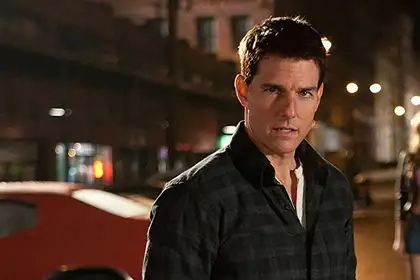
Tom Cruise as Lee Child's fictional retired military policeman Jack Reacher. The character can teach readers a lot about leadership, says Dr Ralph Bathurst.
This is final instalment in a series of five articles on leadership by Dr Ralph Bathurst, who is the academic coordinator for Massey’s Master of Advanced Leadership programme. In each piece he has tackled an aspect of leadership through the lens of a favourite fictional character, Jack Reacher.
Read Article 1: Jack Reacher and the Call to Leadership
Read Article 2: Jack Reacher and Thinking Inside the Box
Read Article 3: Jack Reacher and Leading Within Your Comfort Zone
Read Article 4: Jack Reacher and Leading by Taking Action
So far in our explorations of Jack Reacher in the novel Night School we have circled around leadership concepts but we have not, until now, arrived at the heart of the leadership problem. On the surface, the story is quite simple: he needs to find an American before a large sum of money is exchanged and nuclear weapons fall into the hands of a group of terrorists.
As the novel progresses though, we become aware of a parallel story: there is a group of ultra-nationalist Germans who are thwarting Reacher and his investigating team. This underground movement has sympathisers in the police force, so it’s easy for them to track Reacher’s movements and foil his every step.
The novel moves towards its climax where Reacher meets with the leader of the movement: Herr Dremmler. Reacher had been hunting for him but had no idea what he looked like, until their first and only meeting. Reacher figured that Dremmler had the usual qualities of a head man. He was dressed in a suit and “He looked like the boss of something. He looked like a leader…An imposing individual.”
Reacher fancies himself as a moral philosopher and in their climactic meeting he engages in part soliloquy and part interrogation. Dremmler responds to Reacher with as clear a statement of intent that any leader anywhere would support. He is a man of clear vision and purpose, a strong and determined leader who will courageously pursue his cause of reuniting his nation.
The year is 1999, the eve of the 21st century, and Reacher looks back to look forward. He understands the effects of two devastating world wars and that the potential for another conflagration is very real. Yet according to standard leadership procedures that are still valued today, Dremmler cannot be faulted. Dremmler assures Reacher he has broken no laws and is only full of good intentions.
Furthermore, like any competent leader he will find ways of getting rid of underperformers, and of ensuring that everyone in the enterprise is on the same page, singing from the same song sheet. He has strength and determination, and these are profoundly important leader qualities. Or are they?

Dr Ralph Bathurst.
When leadership is part of the problem
The 20th century leadership legacy is unprecedented destruction and devastation. Today as human communities across the globe consider the kind of world we want to leave our children and grandchildren, we are confronted with significant existential challenges. The United Nations has responded by issuing 17 Sustainable Development Goals (SDGs) to be realised by 2030. The SDGs are a genuine effort to ensure the survival of the human race on Planet Earth, and we only have 12 years left to fulfil them. The urgency is obvious. Yet, as I talk to managers and leaders, I find a staggering indifference if not ignorance of these important goals.
Indeed, I heard one business activist saying recently, “If leaders in organisations do not buy into the SDGs, then there is no chance of them being fulfilled.” I wanted to retort, “You mean to say that the world is going to end, but my leader will not give his support!” As with last century, leaders are the problem. Unbridled power in the name of strength, determination and vision is continuing to stifle the very development that is crucial for our survival.
Strong leaders and helpless followers
Two scholars, Gary Gemmel and Judith Oakley explain this dysfunctional yet still valued way of leading as an “alienating social myth”. Staff in companies develop “learned helplessness”, they become resigned and passively wait for leaders to act. These scholars argue that this form of leadership creates emotionally crippled staff, who gradually become helpless and despairing.
The picture is clear: a strong leader at the top of the enterprise does not take us to healthy, sustainable organisations. It did not work in the past; it does not work today. We need to find alternative ways of doing leadership that are inclusive of all staff; new ways of leading that enable people to discover what it means to be ‘with’ each other rather than ‘over’; ways that avoid past mistakes of giving power to small elites; and to enable all members of the enterprise to take responsibility for their firm in a spirit of openness.
Reacher’s ruminations present a solution. He concludes that it is morally acceptable to eliminate the leader before he does irreversible damage. It takes just two bullets, one to the head and the other to the heart. But this is not a story about Germany and its past. It is a story for today, in our time, in our world. Reacher demonstrates, metaphorically, that the mind and soul of leadership needs a radical conversion if we are to continue inhabiting our world.